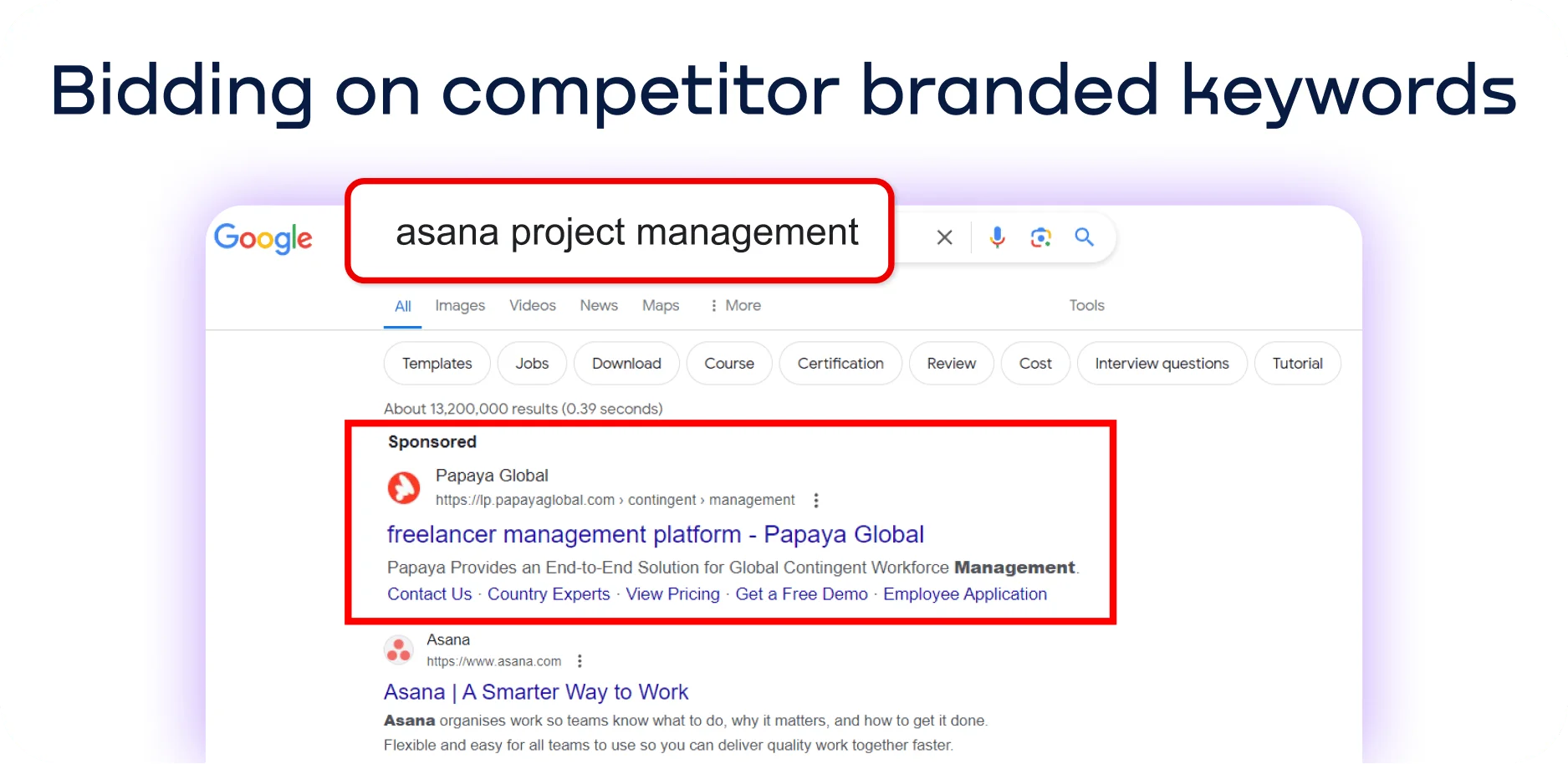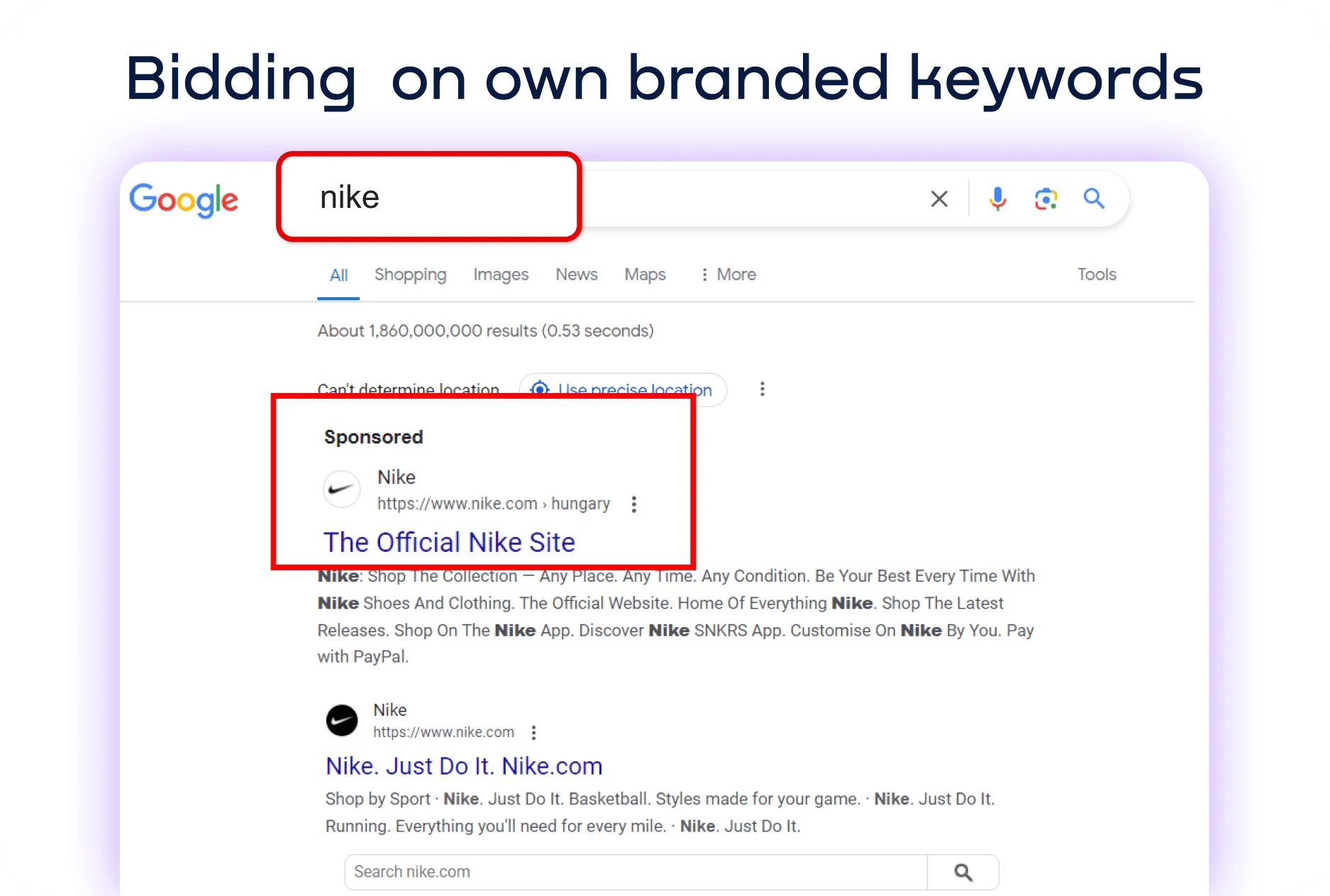
Contents
To use, or not to use your own brand’s keywords in paid search advertising, that is the question. Interestingly, bidding on branded keywords can help you both to defend your brand and attack competitors. While defending, you can push the competitors out of top positions in SERP. By attacking, you will secure the top positions faster than the competitors and increase the number of clicks on your branded queries.
Potentially, using trademarks in PPC ad copy can increase awareness and CTR. But yet, by opting for it you put at risk your advertising budget and organic traffic. Let’s examine pros and cons of bidding on brand’s keywords for you to make well-informed decisions on the digital marketing strategy.
The Advantages of Bidding On Branded Keywords
Using branded terms is helpful if you aim to:
Increase your brand’s visibility and CTR. When you bid on your own branded keywords, you make sure that a brand’s content is displayed at the top of SERPs. Plus, this way you reach the most loyal clients, those who already know your company and even google it. So, they find exactly what they need at the moment and your CTR goes up. By the way, you can intentionally misspell your branded term in paid search advertising if it is a frequent practice for your brand’s audience. So, by bidding on TM, your company will become visible to the clients who mistype the brand in Google search and fail to reach the official website.
Protect your brand against competitors. Avoiding usage of your trademarks in PPC keywords means handing over the top of SERPs to your competitors and basically giving away your customers to them. Besides, if competitors bid on your branded keywords and you do not, users may see their websites while googling your brand. This leads to confusion and decline in clients’ trust and loyalty. That’s why it is important to bid on your brand if you want to protect it.

Build brand awareness. The more often users see your brand, the more likely they are to buy from you. Especially, if they see you at the top of search which is considered a sign of credibility. Also, if you bid on your own branded keywords, you have more control over your brand’s messaging and content that users see when they google your branded term. This strategy can help to increase recognition of your brand terms, which will lead to greater clients’ trust and sympathy.
The Disadvantages of Bidding On Branded Keywords
Let’s have a look at the cons of bidding on brand’s terms:
Additional advertising campaigns increase marketing costs. Bidding on your TM requires extra investments. If you cannot spend more on paid search advertising, you will have to divert resources away from other campaigns to bid on your branded keywords. Anyway, it should be a well-considered decision on how to allocate your marketing budget in the most effective way to mitigate trademark infringement risks.
Cannibalization of organic traffic. Lots of brands still hesitate to bid on their branded keywords because of this issue. It seems reasonable as users may click on paid ads instead of organic listings. So, brands spend money on leads they could have had for free by bidding on their TMs. In fact, you need to look at the numbers in your particular case. Sometimes paid traffic brings you more clicks that it takes from the organic one or does not influence it at all. In such a case, using trademarks in PPC keywords is a worthy investment.

Dependency on brand recognition. If users do not know about your brand, they just will not google it. So, before starting branded campaigns in paid search advertising, you'd better check on your progress in PR. Sometimes it is better to put aside the idea to bid on the brand’s terms and work on the brand’s recognition.
How to protect your brand from unauthorized brand bidding
With all the advantages, there is a significant detail you should be aware of. Bidding on your TM is a tempting way to make easy money for your affiliate partners. By using brand's key words, they get highly qualified branded traffic converting through their affiliate links. However, trademark bidding by affiliates without proper authorization can lead to conflicts and potential legal issues.
Brand violations lead to the situation when CPCs go up, CTR becomes lower, and affiliates compete with your in-house marketing team. In such a case, using your trademarks in PPC may become ineffective and even harmful to your advertising budget.
Regular brand violations monitoring solves the problem with affiliate partners’ who bid on your brand. Fortunately, there are some automated solutions helping with that. For example, Blupear: it monitors your branded search 24/7 and shows you all the violations in a few clicks. You just need to make sure your affiliates do not bid on your TM. Then you can bid on your brand’s terms to your own advantage.
Get a free two-week trial of BluePear to check your affiliates for following the rules!

Balance Your Marketing Campaigns
The key to success is to find balance between branded and non-branded campaigns. If you bid on the brand’s terms, it can increase your brand awareness, visibility and and brand protection competitors. While non-branded ads will reach wider audiences, including those who do not know about your brand yet.
Also, you need to keep under control your affiliates who may bid on your branded keywords and make your own campaigns inefficient. Automated monitoring tools can help you to protect your brand and marketing budget.
FAQ
What does bidding on your own branded keywords mean?
Bidding on branded keywords means running paid search ads that include your company name or trademark. It ensures your official ad appears at the top of search results when users look for your brand. This strategy helps control messaging, defend against competitors, and increase visibility for customers who are already searching for you.
What are the main benefits of bidding on branded keywords?
• Defends brand presence — keeps competitors from outranking you on your own terms;
• Improves visibility — ensures your brand appears in top positions for all variations of your name;
• Boosts CTR and conversions — reaches high-intent users already familiar with your brand;
• Strengthens brand trust — users perceive top-of-page ads as proof of credibility. It’s also useful for controlling the first impression of your brand on SERPs.
What are the potential downsides of bidding on branded keywords?
• Higher advertising costs — it requires allocating part of the paid search budget to defend your brand;
• Possible cannibalization of organic clicks — users might click on paid ads instead of free organic results;
• Limited value for unknown brands — if users don’t search your name yet, it brings minimal traffic. The key is to analyze your own metrics — in some cases, branded ads complement organic performance rather than compete with it.
How can brands protect themselves from unauthorized affiliate or competitor brand bidding?
Unauthorized bidding on your brand by affiliates or competitors drives up CPCs and lowers ROI.
To prevent this, companies should:
• Enforce clear affiliate rules against trademark bidding;
• File complaints when competitors misuse brand names;
• Use automated tools like Bluepear to monitor search results, detect violations 24/7, and collect visual proof. Bluepear’s detection system helps brands quickly stop TM abuse and maintain control over their branded traffic.
How to balance branded and non-branded keyword campaigns effectively?
Successful PPC strategies mix both approaches.
• Branded campaigns defend your brand, drive conversions, and capture high-intent users;
• Non-branded campaigns expand reach and attract new audiences. Regular performance reviews and brand monitoring with Bluepear help ensure affiliates don’t compete with your ads and that budget distribution remains efficient.

